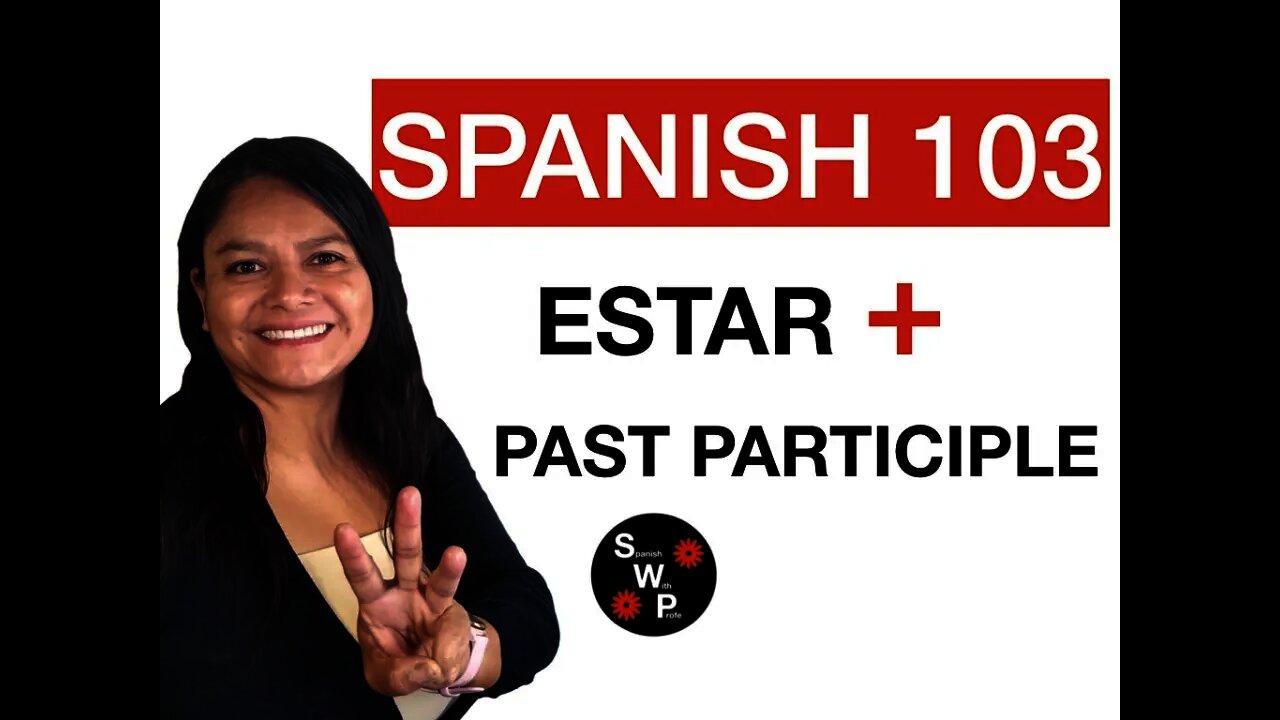Premium Only Content

Spanish 103 - Estar + Past Participle as an Adjective in Spanish for Beginners Spanish With Profe
In this video you will learn estar + the past participle as an adjective in Spanish.
In Spanish just like in English we can use the verb "to be" plus the past participle as an adjective. The past participle of most verbs in English end in -ed, for example like=liked, dance=danced, but there are some that are irregular such as to go=gone, to write=written.
In Spanish, like in English, we have regular verbs and irregular verbs.
In Spanish adjectives must agree in both number (s/pl) and in gender (m/f)
Estar is as followed:
yo estoy
tú estás
él, ella, usted está
nosotros/as estamos
ellos, ellas, ustedes están
The past participle as adjective of regular verbs are below.
-ar=ado, ada, ados, adas
-er/-ir=ido, ida, idos, idas
La planta está muerta. (The plant is dead.)
planta=s/f (noun)
está=s (verb)
muerta= s/f (adjective)
Los libros están abiertos. (The books are open.)
libros=pl/m (noun)
están=pl (verb)
abiertos=pl/m (adjective)
Yo estoy aburrida. (I am bored.)
estoy=s (verb)
aburrida= s/f (adjective)
Las cartas están escritas. (The letters are written.)
cartas=pl/f (noun)
están= pl (verb)
escritas= pl/f (adjective)
The following are the irregular verbs in the past participle as adjectives: (s/pl) and (m/f).
Remember to adjust the past participle as an adjective to denote its gender and its number.
abrir=abierto/a/s
decir=dicho/a/s
descubrir=descubierto/a/s
describir=descrito/a/s
escribir=escrito/a/s
hacer=hecho/a/s
morir=muerto/a/s
poner=puesto/a/s
resolver=resuelto/a/s
romper=roto/a/s
ver=visto/a/s
volver=vuelto/a/s
La puerta está abierta. (The door is open.)
puerta=s/f (noun)
está=s (verb)
abierta=s/f (adjective)
Los carros están abiertos. (The cars are open.)
carros=pl/m (noun)
están= pl (verb)
abiertos= pl/m (adjective)
La verdad está dicha. (The truth has been said.)
verdad=s/f (noun)
está=s (verb)
dicha=s/f (adjective)
Los lobos están muertos. (The wolves are dead.)
lobos=pl/m (noun)
están=pl (verb)
muertos=pl/m (adjective)
To make a sentence negative do the following:
No + estar + past participle (as an adjective)
Los teléfonos no están rotos. (The phones are not broken.)
teléfonos=pl/m (noun)
están=pl (verb)
rotos=pl/m (adjective)
when dropping the -er/-ir add a tilde over the í for the following verbs
caer=caído
creer=creído
leer=leído
oír=oído
reír=reído
sonreír=sonreído
traer=traído
Some Ways Below To Help Out The Channel Listed Below
► DONATIONS via PayPal (To help support the channel you can donate via PayPal): https://paypal.me/SpanishWithProfe?locale.x=en_US
► ROBINHOOD (Get 1 Stock When You Sign Up. Easy to use app for investing and you get a free stock.): https://join.robinhood.com/grants1730
► WEBULL (Get 2 Stock When You Sign Up):https://www.webull.com/activity/get-free-stocks?inviteCode=uYiu2aNdG46N&source=invite_gw&inviteSource=wb_oversea
► CRYPTO.COM Use my referral link https://crypto.com/app/e3p3g4rc9m to sign up for Crypto.com and we both get $25 USD :)
-
 14:52
14:52
Spanish With Profe
1 year ago25 Advanced Spanish phrases that can help you take your Spanish language skills to the next level P1
238 -
 11:22
11:22
Bearing
20 hours ago"Anxious & Confused" Federal Workers FREAK OUT Over DOGE Efficiency Email 💥
64.2K64 -
 1:31:20
1:31:20
Flyover Conservatives
1 day agoUS STOCK MARKET: Sinking Ship - Dr. Kirk Elliott; How I Fought Back Against Woke Schools & Stopped Gender Bathrooms - Stacy Washington | FOC Show
67.7K1 -
 1:08:09
1:08:09
Donald Trump Jr.
14 hours agoFBI Dream Team, Plus Taking Your Questions Live! | Triggered Ep.219
208K281 -
 7:32:37
7:32:37
Akademiks
13 hours agoDrake and PartyNextDoor '$$$4U' Album Sells 250K first week. BIG AK IS BACK.
124K18 -
 3:12:08
3:12:08
MyronGainesX
13 hours ago $32.56 earnedDan Bongino Named FBI Deputy Director, Trump Meets Macron, And More!
100K30 -
 3:12:31
3:12:31
vivafrei
12 hours agoBarnes Live from Seattle - Defending Benshoof in a Case that is CRAY CRAY!
166K51 -
 2:12:12
2:12:12
Robert Gouveia
12 hours agoLiberals EXPLODE over Elon's Email; Lawsuits FLY; Sanctions?? Congrats Dan!
121K41 -
 1:33:36
1:33:36
Redacted News
13 hours agoBREAKING! PUTIN LAUNCHES MASSIVE OFFENSIVE IN UKRAINE AS EUROPEAN LEADERS PUSH FOR MORE WAR
197K277 -
 44:39
44:39
Kimberly Guilfoyle
13 hours agoBetter Days Ahead for the FBI, Live with Asm Bill Essayli & John Koufos | Ep.199
124K32